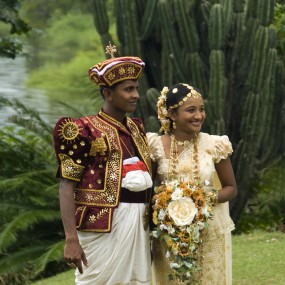Clothing

An example of Kandyan wedding attire in Sri Lanka. Kandyan wedding dress Sri Lanka. “Kandyan wedding dress Sri Lanka.” by Mal B CC BY-ND 2.0
- How does Arjie’s awe at the opulence of female clothing serve as an analogue for his own burgeoning queer self-awareness? How does this develop and change as his parents discover his Bride Bride game?
- Consider the disjunction between Arjie’s expectations of Radja Aunty’s appearance with his first encounter with her. How does Radja Aunty’s own clothing change as she accepts the arranged marriage proposal from Rajan Nagendra? What does this suggest about the relationship between clothing and freedom?
- Consider Arjie’s descriptions of traditional wedding attire before and after witnessing the lost love of Radja Aunty. How does his perception of female clothing change? How does this shift in perception contribute to both his political and self-awareness?
Masculinity
- Consider Arjie’s perception of men early in the novel, specifically the groom in his Bride Bride game, and his initial fantasies of Radja Aunty and Rajan Nagendra’s wedding. How does he perceive traditional masculine roles? How do these connect or diverge from his sense of his own masculinity?
- How does Arjie’s masculine identity differ from that of his brother Diggy? How does this affect their relationship?
- Consider Arjie’s first meeting with Jegan Parameswaran. How does this meeting change the way he perceives masculinity? How do his descriptions of men change after he meets and begins to admire Jegan?
- Consider Arjie’s first day at Victoria Academy, and his first encounter with Shehan Soyza. How are traditional forms of masculinity enforced by the administration and students? How does Shehan Soyza diverge from these norms?
Forbidden Love
- Consider the relationship between Radja Aunty and Anil Jayasinghe, and between Amma and Daryl Uncle. How are the political tensions and social restrictions of Sri Lanka used to illustrate the characters’ lack of freedom in love? How do these social and political restrictions mirror Arjie’s own sexuality?
- How does Arjie’s perception of his father change when he overhears his father describing the affair he had with an English girl in London? How does this mirror the other instances of forbidden love in the novel?
- Consider Diggy’s depiction of Shehan Soyza’s relationship with the Head Prefect. When Arjie confronts Shehan about the relationship, how does Shehan respond? How does this differ from other professions of forbidden love?
Works Cited
- Selvadurai, Shyam. Funny Boy: A Novel. San Diego: Harcourt Brace, 1997. Print.








 ©
©